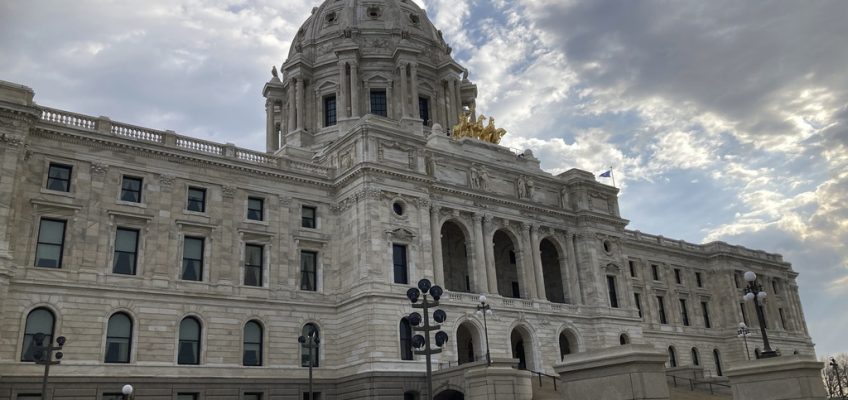A plan to curb student cellphone use in classrooms, a “ban” on book bans, and protections for student journalists are just a few of the new education policies the Minnesota Legislature passed this year.
Those policies will affect Minnesota schools soon, but past that, this year’s education bill won’t have a big impact on school funding, as lawmakers already passed the state budget last year, which boosted spending by $2.3 billion — an 11% increase.
However, tens of millions in additional state dollars will go toward Minnesota schools, mostly to help fund new training mandates created by bills passed last year. Much of the boost will help to fund a new literacy initiative.
Here are some of the changes lawmakers approved that have already been signed into law by the governor:
Cellphone use
School administrators this year asked the Legislature to help address the issue of cellphones distracting students from class.
A provision in the education bill requires Minnesota schools to adopt a policy on student cellphone use by next spring. It had backing from both Democrats and Republicans as a stand-alone proposal but didn’t get bipartisan backing when passed as part of the education package.
The Minnesota Elementary School Principals’ Association and the Minnesota Association of Secondary School Principals will have to develop a “model policy” on cellphone use in schools which school districts and charter schools will have to adopt in May 2025.
Book-ban ban
Under a provision billed by backers as a “ban on book bans,” public libraries aren’t allowed to remove materials based on the viewpoints or ideas they convey.
Democratic-Farmer-Labor lawmakers and DFL Gov. Tim Walz supported the measure in response to school districts elsewhere in the U.S. banning materials touching on topics related to LGBTQ+ topics.
No school district or library in Minnesota has pursued similar bans, though a conservative group has pushed for bans on books in Bloomington.
Libraries and school libraries will still be able to ban books when there is a concern about materials when they have “legitimate” concerns about “potentially sensitive topics” for the library’s intended audience or the work causing substantial “disruption of the work and discipline of the school.”
Public libraries and school libraries also have to adopt policies around selections, challenges and reconsideration of library materials. They’ll also have to produce reports on the challenges and send them to the Minnesota Department of Education that include their decision.
Student press freedom
Student journalists working for school-sponsored media like newspapers and broadcast programs will now have their press freedom specifically protected in state law. Discipline or retaliation for content by school officials against students will be prohibited.
The law will shield student journalists from school interference in determining the news, opinion or feature content and advertising of school-sponsored media or disciplining students for exercising press freedom. It also offers protection for the expression of political viewpoints.
There are limits to student press freedom in the new law. Content that causes a “material and substantial disruption of school activities” or “is directed to inciting or producing imminent lawless action on school premises or the violation of lawful school policies or rules” is not covered. Nor is defamatory content, unwarranted invasions of privacy, or content violating state or federal law
Literacy funding
Much of the money in the education bill will go toward funding new mandates for teacher training. This year’s bill puts about $37 million more toward the Read Act, which requires new training for teachers on literacy instruction. It also gives more flexibility for how districts use the money put toward the program last session.
Backers say the Read Act, which originally passed in 2023, mandates an evidence-based approach that will improve reading outcomes among students. Training in that approach requires additional prep time for teachers.
While the state approved more funding for school districts last year, some of that came with mandates, including the additional training for teachers who have to take extra courses outside of instruction time. The additional funding will in part help pay for substitute teachers while full-time teachers get training, backers say.
Chronic absenteeism
A pilot program aimed at addressing chronic absenteeism in schools is on its way to being established under this year’s education bill. Rates of chronic absenteeism have risen in the years since the pandemic, according to the Minnesota Alliance With Youth.
School districts including Minneapolis and Burnsville are part of the program to combat the trend.
The state is requiring districts to figure out new practices to prevent chronic student absenteeism that could include personalized outreach such as home visits and connecting with students in public areas.
Schools are also expected to figure out strategies to keep students in school, like boosting their sense of belonging in the school community.
Pre-K
Funding for voluntary pre-kindergarten programs will be expanded to accommodate more than 5,000 new seats next year, bringing the total to more than 12,000.
Related Articles
Sen. Nicole Mitchell says she won’t step down after DFL call for resignation
Here’s what outdoors bills passed in Minnesota this session
Nearly 400 independent pharmacies have closed in Minnesota since 1996. Why?
Small rideshare companies said they’d fill void if Uber and Lyft left. What happens now that they’re staying?
What Minnesota lawmakers got done, didn’t get done — and how they’ll campaign on it


Leave a Reply